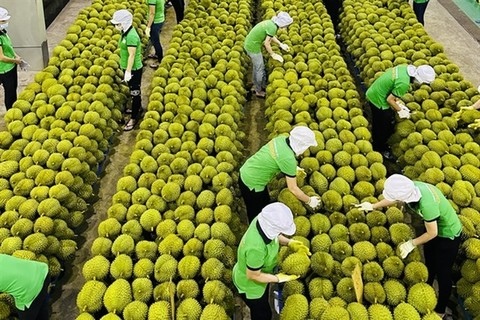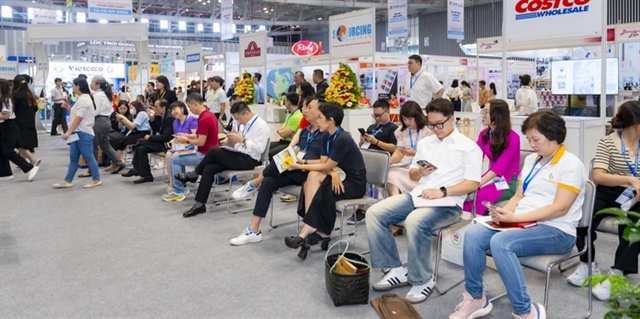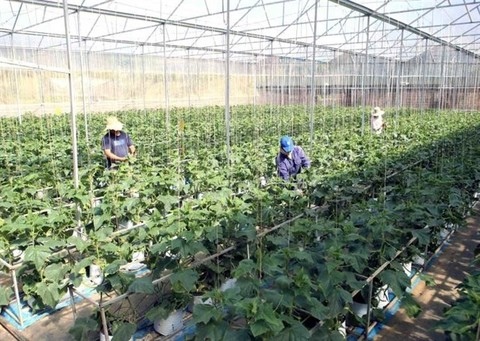Agriculture: new engine for growth
Agriculture: new engine for growth
With strong growth spurred on by rising investments and exports, the high-tech agro-forestry-fishery sector has, for the first time, been officially considered as one of the key propellants of national economic growth in 2019. However, businesses are awaiting new incentives.
Two weeks ago, Minister of Agriculture and Rural Development Nguyen Xuan Cuong worked with Paul Jansen, Belgium’s Ambassador to Vietnam, and Marc Stordiau, chairman of Asian Infrastructure Engineering and Investment, a sister company of the investment group Rent-A-Port, on a project to produce and export safe fruit and vegetables to Europe and the Middle East.
Stordiau suggested co-operation with the Ministry of Agriculture and Rural Development (MARD) to establish a team to undertake the task. High-tech production would be the responsibility of the Vietnamese side, whilst the Belgian side would be in charge of buying products, transportation, and logistics. Rent-A-Port currently has two partners from Belgium and the Netherlands who are interested in joining the project.
Stordiau also asked Cuong to allow his group to study a venture to transport fruit and vegetables from the Mekong Delta region to Europe and the Middle East. The minister agreed to the proposal and wants the task to be implemented as soon as possible.
Two weeks prior, Cuong worked with Huang Jun, general director of a farm produce distribution and consumption group in China’s Liaoning province. Jun told the minister that his group wants to build a ¥150 million ($21.8 million) plant to produce 120 tonnes of high-quality mushrooms a day with modern technology.
In the group’s business strategy, Vietnam would be a key market which could help the group produce and export agricultural products not only to China, but further afield to markets in Europe and Africa.
It is expected that this project, which has received the green light from the Vietnamese side, will be implemented in 2019.
New propellant for growth
According to the MARD, these two new foreign investors will be among a host of those now seeking to increase their investments in the Vietnamese agro-forestry-fishery sector in 2019. Vietnam currently has a great potential to develop its agro-forestry-fishery sector with import tariffs being cut under commitments from free trade agreements, as well as incentives to lure investment.
The MARD is expected to welcome more delegates from foreign businesses seeking investment opportunities in the sector during 2019.
In his New Year report on the country’s economy, Prime Minister Nguyen Xuan Phuc stated that the high-tech agro-forestry-fishery sector will be considered one of the key impetuses for economic growth in 2019, something not seen in previous years.
“Great importance must be attached to luring more businesses into rural and agricultural development,” the prime minister stressed. “In 2018, the economy’s strong growth propellants came from the manufacturing and processing sector (up 12.98 per cent on-year), agriculture (up 3.76 per cent), and a strong 11.7 per cent increase in retail revenue.”
The MARD reported that in 2018, the total export turnover of agro-forestry-fishery products hit a record $40.02 billion, up 9.6 per cent against 2017, and far higher than the initial target of $36-37 billion.
The sector enjoyed a record trade surplus of $7.82 billion, far higher than the $7.2 billion average enjoyed by the rest of the economy. It is expected that the total export turnover of agro-forestry-fishery products for 2019 will be $42-43 billion.
“It is understandable for the agro-forestry-fishery sector to be regarded as a new key driving force for the economy’s growth in the future. In 2018, it grew to its highest level of 3.76 per cent on-year in the 2012-2018 period,” said Nguyen Bich Lam, director of the General Statistics Office. “This sector has been strongly restructured, with expansion in export markets and a growing number of enterprises engaging in agro-forestry-fishery investment.”
Growing investment
As of late 2018, there were nearly 500 valid foreign-invested agro-forestry-fishery projects registered nationwide at over $3.5 billion.
Over the past few years, many foreign companies have entered the Vietnamese market to engage in agricultural investment projects, such as Cargill, CJ, CP, and Mavin Austfeed. Agricultural foreign investment is largely focused on producing and processing animal feeds, and farm produce. Currently, about 60 foreign investors owning over 70 animal feed mills account for 65 per cent of the Vietnamese animal feed market share.
However, foreign direct investment (FDI) in the agro-forestry-fishery sector accounts for only 1 per cent of the country’s total FDI.
Recently, Yutaka Yamamura, vice president of Food Company at Itochu Corporation, worked with Minister Cuong. The vice president said Itochu is conducting a market study in Vietnam, looking for opportunities to buy agricultural products, distribute them in Japan, and then in other foreign markets.
Currently, the Japanese company is importing frozen Vietnamese vegetables and wants to increase trade.
Itochu has also been co-operating with Thailand’s CP Group from early 2015. CP, which is boosting the import of Vietnamese agricultural products to export to Thailand and other overseas markets, is planning to export chicken from Vietnam to Japan.
“We and Itochu will organise more meetings to discuss the export of Vietnamese chicken and pork, along with other farm produce like vegetables and fruit to foreign nations,” Cuong said.
A number of other foreign companies, including the US’ Global Food Importers, Japan’s Ota Floriculture Auction, and South Korea’s Korea Agro-Fisheries & Food Trade Corporation have also inked import deals with local businesses.
For instance, after importing mango produced in the Mekong Delta province of Dong Thap, Global Food Importers is considering a $100 million deal with Vietnamese enterprises in Dong Thap to import frozen fruit and vegetables.
“We particularly like frozen mango and other types of frozen vegetables and fruits in Vietnam,” said Global Food Importers’ general director David Roberts. “In the future, we will also import dried fruit. Vietnam is a large supplier as it has many modern processing facilities.”
In another case, China’s Greenland Business Group recently signed a $500 million deal with the domestic partner Lavifood Company to export assorted agricultural products in 2019.
Gi Bog Song, regional director of Korea Agro-Fisheries & Food Trade Corporation, said that South Korea has only 2.5 million farmers, while its consumption demand has been soaring.
“We depend to a great extent on imported products. Our consumers are shifting from Chinese to Vietnamese products which are cheaper and of higher quality,” Song said.
Awaiting new policies
PM Phuc recently assigned the Ministry of Planning and Investment (MPI) to submit a draft directive on agricultural investment attraction to the government. He also requested ministries, agencies, and localities to strictly implement Decree No.57/2018/ND-CP issued in April 2018 on mechanisms and policies to attract investment in agricultural and rural development.
He asked the MPI to issue a guide to the implementation of Decree 57 so that companies can be incentivised. The decree covers many types of new incentives regarding the rental of land and water surfaces, land concentration, the transfer and the application of technology, human resources training, and investing in manufacturing agricultural machinery.
Specifically, under the decree, the government will finance 60 per cent of investment costs and a maximum of VND15 billion ($652,173) for an agricultural product processing project to build infrastructure systems for waste treatment, transport, electricity, and water. Investors will also be funded with 60 per cent of their investment cost and a maximum of VND5 billion ($217,391) for an equipment-manufacturing factory to build the same infrastructure systems.
In addition, PM Phuc also ordered that 50 per cent of agricultural and rural administrative procedures be removed in favour of people and businesses.
Further fueling the agricultural sector, the prime minister also requested the amendment of Decree No.55/2015/ND-CP on credit policies for agricultural and rural development, so as to increase maximum loans without collateral for individuals and households.
The amendment must expand the beneficiaries of the credit policy in the field of hi-tech agriculture, and allow for the use of assets made from the loans of high-tech agricultural projects as collateral.
“It is urgent to complete the legal framework for the sector as agriculture has the enormous potential for growth,” the prime minister stressed.
According to Minister Cuong, if these policies come into force, they will greatly attract foreign investors like Rent-A-Port and Huang Jun from China.
“We are awaiting new incentives and new waves of investments into the agro-forestry-fishery sector. Despite difficulties, the sector boasts great potential for further development,” Cuong stressed.








